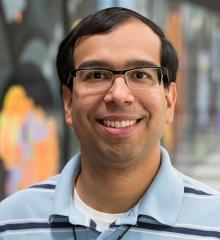Seminar 22nd July 2015 11 a.m. Building 29, Room 1101, Highfield Campus, University of Southampton
Computational Science at the Argonne Leadership Computing Facility
Dr Nichols A. Romero
Argonne National Lab Argonne Leadership Computing Facility (ALCF)
- Web page
- https://www.alcf.anl.gov/staff-directory/nichols-romero
- Categories
- Complex Systems, HPC, NGCM
- Submitter
- Luke Goater
Abstract:
The goal of the Argonne Leadership Computing Facility (ALCF) is to extend the frontiers of science by solving problems that require innovative approaches and the largest-scale computing systems. ALCF’s most powerful computer -- Mira, an IBM Blue Gene/Q system – has nearly one million cores. How does one program such systems? What software tools are available? Which scientific and engineering applications are able to utilize such levels of parallelism? This talk will address these questions and describe a sampling of projects that are using ALCF systems in their research, including ones in nanoscience, materials science, and chemistry. I will also present the allocation programs available to U.K. researchers and the international community. Lastly, I will present some information about the future ALCF systems, Theta and Aurora.
Nichols A. Romero is a staff scientist and team lead at the Argonne Leadership Computing Facility. He obtained a B.S. in Physics from the Massachusetts Institute of Technology (1999), and a Ph.D. in Physics from the University of Illinois at Urbana-Champaign (2005). He was a National Research Council post-doctoral fellow at the U.S. Army Research Laboratory (2005-2007) and later worked as a Computational Scientist in the High-Performance Computing Modernization Program (2007–2008) for the Department of Defense. Romero was a post-doc at the ALCF (2008-2010) prior to being reclassified to staff. His primary research interest is massively parallel electronic structure calculations in condensed matter physics.
Areas of Interest:
Electronic Structure of Condensed Matter, DFT, QMC, programming models, parallel dense linear algebra
